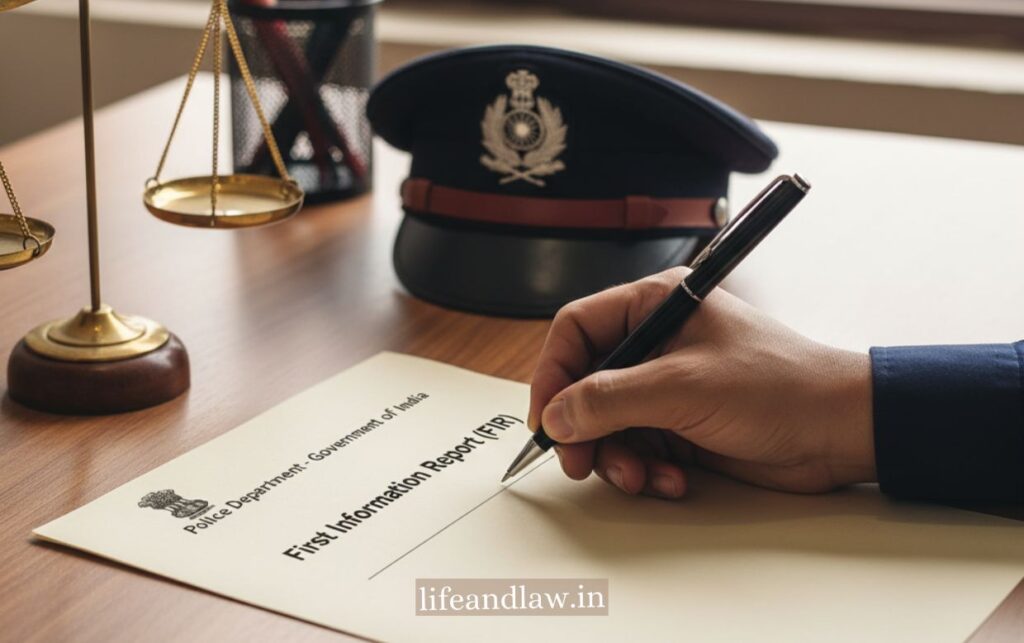Trending

Filing a FIR (First Information Report) is an important initial step in reporting a crime and initiating the criminal justice process in India. The Bharatiya Nagarik Suraksha Sanhita, 2023 has made the FIR procedure more open and citizen-friendly, allowing citizens to seek justice through appropriate legal channels. It serves as the formal record of a significant crime and launches a police inquiry.
This article attempts to educate residents on the necessity of FIRs, the proper procedure for filing them, and how to respond if the police refuse registration, thus empowering them to properly exercise their rights.
An FIR is the official written document created by the police when they receive information concerning the commission of a cognisable offence (a serious felony that permits police to arrest without a warrant). The FIR includes the nature of the crime, date and time of occurrence, location of the incident, and information about the individuals involved or witnesses. Once filed, it initiates a formal police inquiry.
Every Indian citizen has the legal right to submit a FIR. Without this critical step, no police investigation can proceed, making it difficult to ensure justice is served. An FIR also serves as a deterrent to the suppression of crimes. Citizens must be informed of their rights and confidently exercise them when necessary.
The legal basis for FIRs is defined in Section 173 of the BNSS,2023, which establishes a systematic filing process. Citizens have the following alternatives for registering a FIR:
In all cases, the complainant has the right to a free copy of the FIR, which is necessary for follow-up.
The Zero FIR concept allows for fast reporting of crimes, particularly in emergencies or where there is jurisdictional confusion. This ensures that fast action is taken without any delay.
Zero FIR Procedure:
A complaint is filed at any police station, either verbally or electronically.
The police filed a Zero FIR (under BNSS Section 173(1)).
If the complaint is filed electronically, a signed copy must be submitted within three days.
A complimentary copy is given to the complainant.
The case is transferred to the appropriate police station for investigation.
A standard legal investigation begins.
The e-FIR system enables citizens to make complaints from anywhere, without having to visit a police station. This digital method improves convenience and availability, particularly in nonviolent cases.
Steps for Filing an e-FIR:
Special safeguards are in place for women to provide dignity and protection during complaint registration, especially for violations under specific sections (64-71,74-79, and 124 of the BNS,2023):
A female police officer or staff member must document the complaint.
If the victim is physically or mentally challenged, the complaint must be recorded at her home or safe place, accompanied by a translator or special educator.
The complaint must be video recorded.
The statement must be presented promptly to a Judicial Magistrate.
These regulations contribute to a safer atmosphere for victims and reduce secondary trauma throughout the complaint procedure.
If the crime entails a punishment of 3 to 7 years, the police must proceed with extra caution and either:
In either case, the procedure must be clear and timely.
If a police officer refuses to register a FIR, the citizen has a legal remedy:
This method ensures that no case is disregarded and provides a path to justice.
Filing a FIR is a fundamental right and duty for all Indian citizens. In this article Adv. Abdul Mulla, through www.asmlegalservices and www.lifeandlaw.in, highlights how reforms like e-FIR, zero FIR, and special provisions for women have simplified and improved access to justice by making the process more transparent and accountable.
He emphasises the importance of understanding the proper procedure for filing a FIR, as well as the escalation routes available if the police deny registration. Empowered and knowledgeable individuals are essential for establishing a fair and responsive judicial system.
Adv. Abdul Mulla (Mob. No. 937 007 2022) is a seasoned legal professional with over 18 years of experience in advocacy, specializing in diverse areas of law, including Real Estate and Property Law, Matrimonial and Divorce Matters, Litigation and Dispute Resolution, and Will and Succession Planning. read more….
Copyright BlazeThemes. 2025